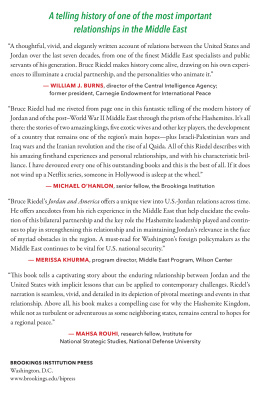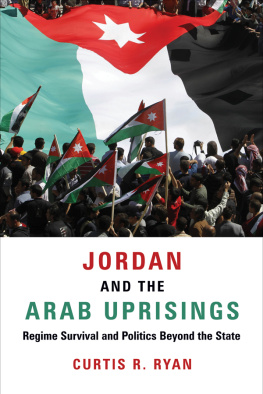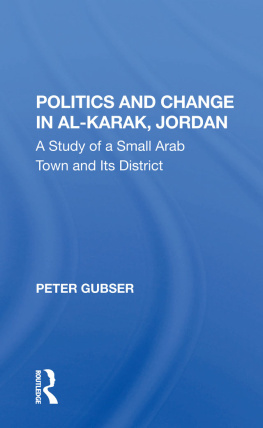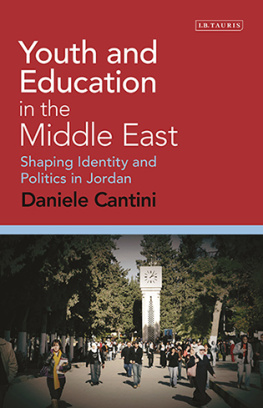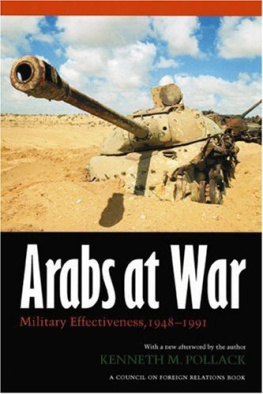ROUTLEDGE LIBRARY EDITIONS: JORDAN
Volume 4
POLITICS AND THE MILITARY IN JORDAN
POLITICS AND THE MILITARY IN JORDAN
A Study of the Arab Legion 19211957
P. J. VATIKIOTIS
First published in 1967 by Frank Cass and Company Limited
This edition first published in 2017
by Routledge
2 Park Square, Milton Park, Abingdon, Oxon OX14 4RN
and by Routledge
711 Third Avenue, New York, NY 10017
Routledge is an imprint of the Taylor & Francis Group, an informa business
1967 P. J. Vatikiotis
All rights reserved. No part of this book may be reprinted or reproduced or utilised in any form or by any electronic, mechanical, or other means, now known or hereafter invented, including photocopying and recording, or in any information storage or retrieval system, without permission in writing from the publishers.
Trademark notice: Product or corporate names may be trademarks or registered trademarks, and are used only for identification and explanation without intent to infringe.
British Library Cataloguing in Publication Data
A catalogue record for this book is available from the British Library
ISBN: 978-1-138-62955-4 (Set)
ISBN: 978-1-315-20177-1 (Set) (ebk)
ISBN: 978-1-138-70645-3 (Volume 4) (hbk)
ISBN: 978-1-315-20178-8 (Volume 4) (ebk)
Publishers Note
The publisher has gone to great lengths to ensure the quality of this reprint but points out that some imperfections in the original copies may be apparent.
Disclaimer
The publisher has made every effort to trace copyright holders and would welcome correspondence from those they have been unable to trace.
POLITICS AND THE MILITARY IN JORDAN
A STUDY OF THE ARAB LEGION 19211957
P. J. VATIKIOTIS
FRANK CASS & CO. LTD. 1967
First published in 1967 by
FRANK CASS AND COMPANY LIMITED
67 Great Russell Street, London WC1
Copyright 1967 P. J. Vatikiotis
TO
THE BRITISH OFFICERS WHO TRAINED
AND COMMANDED THE LEGION
UNTIL 1956
AND TO THEIR ARAB SUCCESSORS
THIS monograph grew out of a study initially undertaken for a wider collaborative inquiry into the political role of the military with several colleagues in American universities. Professor John P. Lovell of the Department of Government, Indiana University, co-ordinated what was purely individual research on the military in a number of countries in Africa, East Asia, South and South-east Asia, and the Middle East. The particular research interest of this group is partially reflected in this monograph in my formulations about the military in Jordan and in Part III dealing with politics and the military.
As a study in civil-military relations, this is only an intensive examination of one case in the setting of Jordan. As such, therefore, it does not seek to generalise about these relations everywhere. Instead, the study attempts to gauge these relations by the performance of the military in Jordan in the period 19211957. Even though to the extent that it can be determined, the social background of army officers is described and discussed, the emphasis in this study, however, is on the performance of these officers in certain political situations.
Briefly, this is an inquiry consisting of three parts. In addition to a general introduction which tries to set the context of the study, the first part of the inquiry is a general consideration of the peculiar historical conditions from which a state emerged in Jordan, and the role of the Arab Legion in its creation and consolidation. The second part describes the beginnings of the Arab Legion, its evolution and development from 1921 to 1957. Illustrative material on the organisation, structure, and composition of the Legion during the period of its greatest and most rapid expansion (19481956) is also presented here. Finally, the performance and involvement of the Legion in the politically turbulent period (19541957) is discussed in some detail. Here an attempt is made to assess the role of the Legion in maintaining the integrity of the regime in Jordan at a time when the integration of west and east Jordan was at its most problematic and dangerous stage.
For information about the rapid expansion of the Legion in the period 19481956, I am grateful for the assistance of several British officers who had served with the Legion, among them Major-General Lunt, Brigadier Peter Young, Brigadier Elliott, Colonel Walden, Colonel Vaines, Lieut.-Colonel Blackden, Major Horne and Major Freeman. I have also had the benefit of the views and wise counsel of Sir Alec Kirkbride, especially on the early days of the Transjordan Principality and the long reign of the late King Abdullah. Sir Alec and Brigadier Young read the first draft of the monograph in its entirety and offered valuable comments and criticism for its improvement. So did Professor Morris Janowitz of Chicago University. I owe, however, a special debt of gratitude to Lieut.-General Sir John Glubb for his extensive comments and criticisms which helped me to avoid many errors.
My colleagues Professors Bernard Lewis and Ernest Gellner read the manuscript and made many suggestions for its improvement. Professor Gellner in particular made extensive comments about the crucial problem of establishing a viable central authority in areas, or countries, where the prevailing ethos is that of a tribal society. Another of my colleagues, Lieut.-Colonel H. Moyse-Bartlett, Secretary of the School of Oriental and African Studies, brought to my attention technical military literature relevant to my study, and helped me to secure it.
While I gratefully acknowledge my debt to all the persons mentioned above and many others I have not named, I remain solely responsible for any errors of fact, and for the views expressed in this study.
P. J. V.
December 1966
19201957
| 11 November 1920 | Abdullah arrives at Maan from the Hejaz |
| 2 March 1921 | Abdullah enters Amman and sets up his first private government |
| 28 March 1921 | ChurchillAbdullah talks in Jerusalem which led to the formation of the Principality of Transjordan under Amir Abdullah |



